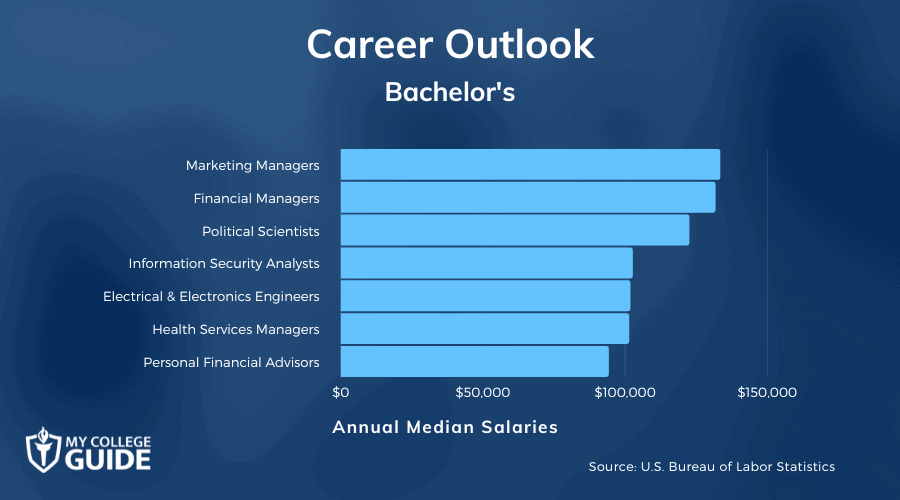There are many 4 year online colleges that offer the opportunity to earn a bachelor’s degree in a subject area of your choice. Earning an undergraduate degree can help you learn new skills, broaden your knowledge base, meet new people, and prepare for a career after college.

Many individuals who choose to earn a 4 year degree are dedicated, motivated, and passionate people with an appreciation for learning.
Editorial Listing ShortCode:
If you want to break into a particular industry, gain subject-specific knowledge, or explore a personal interest, earning a bachelor degree online is a great place to start.
Online Bachelor’s Degrees Available

When looking for an online bachelor degree program, it’s important to consider the variety of different online degrees available. Every college or university offers its own unique programs, coursework, and schedules.
Some of the most popular degree programs include:
- Accounting
- Art and Design
- Business Administration
- Communications
- Computer Science
- Counseling
- Criminal Justice
- Education
- Engineering
- English
- Finance
- Healthcare
- Information Technology
- Marketing
- Nursing
- Political Science
- Psychology
- Theology and Ministry
Of course, some of these online colleges take it a bit further and offer master’s degrees, non-credit college classes, and more, so you can continue your education from the comfort of your home.
Online Bachelor’s in Accounting

An undergraduate degree in accounting can help you develop the technical and analytical skills needed to be successful in the field. You may study areas such as budgeting, reporting, and business law. In addition to courses specific to the field of accounting, you may also take more general courses, like English composition, communication, and statistics.
Editorial Listing ShortCode:
Many people who earn their bachelor’s degree in accounting find themselves presented with a wide variety of employment options. Because all organizations and businesses handle budgets and monetary expenses, there is a high possibility that you can find work at a company whose mission you value.
Online Bachelor’s in Art and Design

A bachelor’s program in art and design provides an opportunity to build and strengthen your creative skills. Most programs offer the option to specialize in a specific area, such as graphic or web design. You may take courses like branding, illustration, or mixed media.
Editorial Listing ShortCode:
One of the great things about earning a degree in art and design is the opportunity to be creative in your professional work. Many graduates go on to become fashion designers, graphic designers, or craft and fine artists. Others may use their abilities to enter into game design, illustration, or film.
Online Bachelor’s in Business Administration

In an undergraduate business administration degree program, students explore the different aspects of well-run businesses. This field of study can help you build your knowledge in areas like finance, management, and marketing and learn how to use it to solve real-world business issues.
Editorial Listing ShortCode:
After earning a bachelor’s in business administration, you can pursue careers in a range of business settings both large and small. Graduates often pursue professional opportunities as market research analysts, sales managers, or business consultants. They may also become human resources specialists, loan officers, or event planners.
Online Bachelor’s in Communications

Communications is the perfect field of study for anyone who enjoys collaboration, team building, and problem-solving. In an undergraduate communications program, you will study successful communication across a range of platforms and contexts. Courses may include content analysis, rhetoric and popular culture, and crisis communications.
Editorial Listing ShortCode:
After earning a communications degree, many people pursue jobs as content writers or editors, public relations specialists, marketing coordinators, or business reporters. Because many roles require strong interpersonal skills, a degree in communications can lead to opportunities in a diverse range of fields.
Online Bachelor’s in Computer Science

A computer science degree may appeal to individuals with an interest in technology and a knack for math and problem-solving. Many computer science curriculums include courses such as data structures, computer operating systems, machine organization, and design and analysis of algorithms.
Editorial Listing ShortCode:
Common careers in this field include web and software developers, computer systems analysts, software quality assurance testers, and network and computer systems administrators. The need for employees with an advanced understanding of technology and ongoing developments in this area is growing at a fast pace, making this degree a potentially lucrative one to earn.
Online Bachelor’s in Counseling

If you are passionate about helping others and have strong interpersonal, listening, and communication skills, a degree in counseling may be a good fit for you. In a typical bachelor’s in counseling program, you may study topics like family dynamics, patient evaluation and treatment, counseling skills, and addiction.
Editorial Listing ShortCode:
Depending on your selected concentration, you can pursue a job counseling different populations of people. You might become a marriage and family therapist, rehabilitation counselor, high school counselor, or mental health counselor. In most cases, the counseling positions you will pursue will also require you to earn a license in order to be qualified to practice.
Online Bachelor’s in Criminal Justice

In a criminal justice bachelor’s degree program, students study topics in corrections, law, criminological theory, and justice administration. Typical courses might include Social Justice in Criminology, Police and Society, American Criminal Courts, and Adult Corrections.
Editorial Listing ShortCode:
Graduates of criminal justice degree programs often go on to become forensic accountants, criminal investigators, homicide detectives, or lawyers. For some positions, such as lawyers, additional schooling and licensing exams are required. A deep understanding of the criminal justice system can also be helpful in many nonprofit and social services roles.
Online Bachelor’s in Education

If you are motivated by the idea of helping others learn, working in teams, and building trusting relationships, you might consider a degree in education.
Educators often change the lives of individuals and communities through the care and instruction they provide. Typical courses in an education program may include Classroom Management, Assessment and Evaluation, and Human Development.
Editorial Listing ShortCode:
After earning a bachelor’s degree in education, many people go on to become teachers at the elementary or high school level. Some work their way up to leadership roles, such as school principals or administrators.
Online Bachelor’s in Engineering

An undergraduate engineering program may be perfect for those who are innovative and creative problem-solvers. The skills and knowledge that you learn in an engineering program will depend largely on the type of engineering you choose to focus on. You may choose from specializations like chemical, electrical, aerospace, or industrial engineering.
Editorial Listing ShortCode:
Many people with engineering degrees go on to become engineers in their fields of study, such as aerospace engineers or industrial engineers. Others pursue alternative careers, such as IT consultants. For some engineering roles, like biomedical or software engineers, a more advanced degree may be required.
Online Bachelor’s in English

A bachelor’s degree in English is a versatile degree to earn because many companies and organizations seek out employees with strong analytical and written communication skills. While you may have the option to choose a specialization within the field, typical core courses in an English program include Literary Theory, Rhetoric and Research Writing, and Communication.
Editorial Listing ShortCode:
Many English majors find professional work in a variety of fields, like editing, publishing, writing, or education. Some may even work for the government or various nonprofit organizations in roles such as communications officers, editors, or public relations managers.
Online Bachelor’s in Finance

Taking an online bachelor’s in finance degree program can give you the opportunity to develop foundational finance skills with an emphasis on entrepreneurial thinking, teamwork, and global responsibility. A typical finance curriculum covers topics like corporate finance, applied statistics, macroeconomics, and investments.
Editorial Listing ShortCode:
A background in finance can help you land a job in a wide range of fields, making it easier to align your career with your personal values. You might pursue a role as a commercial investor, financial planner, insurance agent, or public accountant. Other common careers in finance include real estate agents, chief financial officers, and hedge fund managers.
Online Bachelor’s in Healthcare

A bachelor’s degree program in healthcare will look different depending on the aspect of healthcare you choose to focus on. You can choose from healthcare administration, health sciences, healthcare management, or healthcare coordination. Depending on your degree, you may take classes like Nutrition, Healthcare Policy, and Healthcare Information Systems.
Editorial Listing ShortCode:
Studying healthcare can potentially lead to a career as a medical and health services manager, health education specialist, or health information specialist. You can also pursue a career outside of healthcare, such as human resources manager, administrative services manager, or facilities manager.
Online Bachelor’s in Information Technology

As an information technology major, you will likely explore topics in network security, operating systems, web development, information technology management, and scripting and programming. Common courses for this major include user Interface Design, Linux Foundations, and Emerging Technologies.
Editorial Listing ShortCode:
Plenty of diverse industries are searching for individuals with a strong foundation in information technology. Many graduates find work in industries such as healthcare, nonprofit organizations, and corporations. They often work as IT managers, application developers, or database administrators. Many of these positions provide job security and solid benefits options.
Online Bachelor’s in Marketing

A bachelor’s degree program in marketing can help you develop the skills and tools needed to sell and promote products, understand consumer behavior, and analyze current challenges in the field. While curricula differ between schools, you may take courses in branding and design, marketing research, digital marketing, and personal selling.
Editorial Listing ShortCode:
Earning a degree in marketing can open up many professional doors after graduation. You might use your digital skills to become a social media manager, media buyer, or SEO manager. If you enjoy communicating and collaborating with others, you can pursue roles as a fundraiser, event manager, or public relations specialist.
Online Bachelor’s in Nursing

Earning a bachelor’s degree in nursing can help you develop the theoretical knowledge and practical skills needed to be successful as a nurse. Standard nursing curriculums cover topics like anatomy and physiology, basic pharmacology, nursing theory, statistics, and microbiology.
Editorial Listing ShortCode:
In order to work as a nurse, you will need to pass the NCLEX licensure exam. After taking the exam, you can pursue work as a nurse in a variety of areas, including nursing and delivery, critical care, and medical-surgical. Some people also pursue non-nursing positions, such as nurse case managers, nurse writers, and nurse administrators.
Online Bachelor’s in Political Science

Students enrolled in an undergraduate political science program explore a range of topics related to politics, justice, and government. Earning this degree can help you learn how to think critically and develop solutions to address major national and international issues. Typical topics of study include international relations, comparative law, US foreign policy, and elections.
Editorial Listing ShortCode:
After graduation, many people step into professional roles that have a positive influence on individuals and communities. Common careers in this field include urban and regional planners, lawyers, lobbyists, and policy analysts. Some graduates also choose to use their strong communication and writing skills to work as copywriters, journalists, or web content editors.
Online Bachelor’s in Psychology

The study of human behavior is at the center of a degree program in psychology. Students take courses in social psychology, human relations, social problems, and research methods in psychology. You will likely also have the opportunity to select a concentration, making it easier to tailor your degree to align with your interests and professional goals.
Editorial Listing ShortCode:
Many graduates with degrees in psychology go on to have a positive impact on the lives of others. Some find work as substance abuse counselors, marriage and family therapists, or psychiatric technicians. Others use their knowledge of human behavior to pursue roles like human resources specialists.
Online Bachelor’s in Theology and Ministry

Students in an online bachelor’s program in theology and ministry study spirituality, ethics, and religion. You may take courses such as Old Testament as Literature, Religion and Discrimination, and Women in Christianity. You may also take practical courses, like Public Speaking, Speech Writing, and Literature Analysis.
After earning an undergraduate degree in theology and ministry, many individuals are ready for leadership roles in missions or church ministries. Those with this degree commonly become pastors, youth pastors, church administrators, or chaplains. Others pursue roles outside the church and become counselors, teachers, sociologists, or writers.
Editorial Listing ShortCode:
As you decide what undergraduate program of study is right for you, it is beneficial to consider your interests, academic and personal strengths, and career aspirations.
Careers & Salaries

Earning a bachelor’s degree can help you develop new skills, broaden your knowledge base, and stand out to potential employers.
It is important that you have an understanding of your personal interests, motivators, and career goals before you apply to undergraduate degree programs. This can help you find schools that offer the programs you need to meet your goals and begin to establish yourself in a specific field.
According to the Bureau of Labor and Statistics, these are some of the most commonly pursued jobs in the fields listed above:
| Careers | Annual Median Salary |
| Advertising, Promotions, and Marketing Managers | $133,380 |
| Financial Managers | $131,710 |
| Political Scientists | $122,510 |
| Information Security Analysts | $102,600 |
| Electrical and Electronics Engineers | $101,780 |
| Medical and Health Services Managers | $101,340 |
| Personal Financial Advisors | $94,170 |
| Computer Programmers | $93,000 |
| Psychologists | $81,040 |
| Registered Nurses | $77,600 |
| Accountants and Auditors | $77,250 |
| Writers and Authors | $69,510 |
| Police and Detectives | $66,020 |
| Public Relations Specialists | $62,800 |
| Kindergarten and Elementary School Teachers | $61,350 |
| Graphic Designers | $50,710 |
| Marriage and Family Therapists | $49,880 |
| Clergy | $49,720 |
In addition to these career paths, there are endless opportunities in each field. With many professional positions, there is also the possibility of advancement or growth into leadership roles. If you study education, for example, you might begin your career as a teacher and gain enough experience to become an administrator in the future.
While earning a bachelor’s degree in a subject area of interest can certainly help expand your job prospects after graduation, it does not promise a specific title or salary. Your previous professional experience, demonstrated skills, and geographic location can all impact your job search process.
How to Choose an Online College

Deciding between 4 year colleges online is a personal process. As you make your choice, there are a few factors to take into consideration.
- Cost: While attending school online does eliminate some expenses, the cost is still a determining factor for many individuals. Many online schools offer programs at a diverse range of prices, making it easier to find one within your budget.
- Format: Classes available online are typically offered in synchronous (live) or asynchronous (pre-recorded) formats. Considering your availability, learning style, and personal preferences can help you choose a program that offers courses in the format you like best.
- Professional Aspirations: If you have a specific professional position or industry that you would like to work in, it is important that the college you attend offers the necessary programs. If you are hoping to become a computer programmer, for instance, you would want to make sure that the college you select has a robust computer engineering program.
- Available Support: Attending classes, completing work, and balancing life and school can become overwhelming. It can be helpful to research the available academic, financial, and emotional support available at your prospective schools.
Putting in the time and effort to research each of these areas for your schools of interest can help ensure that you select the right school for your needs. At the end of the day, the best choice is one that offers exciting, relevant educational programs and fits your schedule and budget.
Pros and Cons of Online Colleges

Within recent years, there has been huge growth in the number of online bachelor degrees offering exceptional academic programs.
Editorial Listing ShortCode:
The question of whether or not an online college program is right for you is a personal decision. There are several benefits and drawbacks to consider when comparing online vs. traditional classes. Determining whether the pros outweigh the cons is up to your personal needs and schedule. Here are some of the benefits of choosing an online program.
- Flexibility: You can attend class anywhere with a reliable internet connection, making it easier to manage your schedule.
- Choice: If the right program is one that is located far from home, you can still attend without the pressure of relocating.
- Savings: Several expenses are eliminated when attending school online, such as housing and relocation fees, helping you save money.
- Tutoring: Many online programs offer virtual tutoring options, allowing you to receive extra academic support without leaving the comfort of your home.
- Affordability: Some online colleges are cheaper than their brick-and-mortar counterparts while still offering outstanding academic programs.
On the flip side, it’s a good idea to consider the downside of online classes, as well. This will help you make the right decision based on what you need from a school program.
- Discipline: You are in charge of your own schedule, requiring you to have exceptional time-management skills.
- Loneliness: If you enjoy forming close connections with classmates, it can be difficult to do so in an online program since everyone is geographically spread out.
- Tech heavy: Online programs often require a higher level of technical proficiency than in-person options.
- Course availability: Not all courses may be offered in an online format.
- Professor meetings: The ability to meet with a professor may be limited.
Reflecting on these pros and cons and adding your own can help you make an informed and thoughtful decision and help you find the perfect fit for your education needs.
How to Apply for Online Colleges

In addition to a small application fee, many schools include a list of required items in their admissions packet. While each school has a unique admissions process, common application requirements include:
- SAT or ACT scores (only some schools require them)
- Personal statement
- Official transcripts
- Letters of recommendation
These materials are helpful for admissions teams as they decide whether applicants are a good fit for their school. Not only do they shed light on academic success, but they also provide insight into your personal goals and the ways in which others view your strengths and character.
It is important to give each requirement equal attention, as they work together to paint a holistic picture of who you are as an applicant.
Accreditation

As you search for 4 year online degrees, it is important to check the accreditation status of each school. If a school is accredited, they have undergone a review process by a team of internal and external assessors.
Editorial Listing ShortCode:
Things like operational policies and educational programs are examined to ensure that they meet certain guidelines. Employers often require that applicants have a degree from an accredited college in order to be considered for employment.
Financial Aid and Scholarships

If you are on a tight budget, applying for financial aid and scholarship programs can help alleviate some of your financial concerns.
Most colleges and universities recognize that some of the brightest applicants do not have the financial means to attend their school. To provide more equal access to all applicants regardless of socioeconomic background, individual schools, the federal government, and state governments work together to provide several different forms of financial aid.
The easiest way to find out how much federal financial aid you qualify for is by filling out the FAFSA, also known as the Free Application for Federal Student Aid. You can complete the form at no cost to you and will receive a breakdown of the loans, grants, and work-study programs you are eligible for.
State aid opportunities vary between locations and can be researched for more information. Lastly, many schools offer scholarship opportunities to their enrolled students. There are many different kinds of scholarships, and you can look for the ones for which you meet the specified requirements for application.
What Can You Do with an Online Bachelors Degree?

There are many professional opportunities for individuals with a bachelor’s degree in a specific field. Data from the BLS can help you choose the right path for you.
For example, the BLS states that an undergraduate degree in marketing, for instance, can lead to a career as a market research analyst or advertising, promotions, and marketing manager. Similarly, a bachelor’s degree in psychology can lead to a career as a marriage and family therapist, rehabilitation counselor, school counselor, or substance abuse counselor.
The most important thing is that you select online college degrees that align with your professional and educational aspirations.
How Long Does It Take to Get a College Degree Online?
If you follow a traditional, 16 week semester and attend school full-time, it will typically take 4 years to earn a bachelor’s degree. If you follow an 8 week semester and stay continuously enrolled year-round, you can likely finish in less time.
Many online colleges also offer flexible schedules and timelines. This can make it easier to fit your courses into a busy work or home life schedule. It may also change or extend the amount of time it takes to complete your degree.
Are Online Degrees Respected?

With the rise in online degree options comes a shift in public opinion about those degrees. Degrees earned online are generally considered valid by most employers and individuals, with some exceptions. It is also important to remember that not all online colleges offer the same experience or educational programs.
When determining the validity of an online degree, employers often consider the institution at which you earned your degree, your school’s accreditation status, and the type of learning you engaged in (exclusively online or a hybrid of in-person and virtual learning).
Is an Online Bachelor Degree Worth it?

Yes, an online bachelor’s degree is worth it for many students. Many employers have degree requirements for certain positions. They look for applicants who attended an accredited college or university and have received the necessary training and information to be successful in the industry.
Editorial Listing ShortCode:
The BLS also states that many careers commonly pursued by individuals with bachelor’s degrees are experiencing employment growth at a rate faster than the national average for other occupations. Computer systems analysts, for example, have a project job growth rate of 9% over the next 10 years.
Universities Offering Online Bachelors Degree Program
Methodology: The following school list is in alphabetical order. To be included, a college or university must be regionally accredited and offer degree programs online or in a hybrid format.

Arizona State University was ranked in the listing for Top 10 Online Bachelor’s Programs by U.S. News and World Report. ASU has an extensive catalog of programs for students seeking their bachelor’s degrees. Courses are 6 to 7.5 weeks long, and many are asynchronous. Students can major in fields such as anthropology, data science, and urban planning.
Arizona State University is accredited by the Higher Learning Commission of the North Central Association of Colleges and Schools.

There is no distinction between Colorado State University’s online and on-campus degrees. CSU charges all students in-state tuition, even those not living in Colorado. The school offers 15 different bachelor’s degrees. Among these are a BA in Economics or Journalism and Media Communications and a BS in Psychology or Computer Science.
Colorado State University is accredited by the Higher Learning Commission.

Florida International University’s bachelor’s degree programs are entirely online. The school has been offering online degrees for 20 years and has an R1 Carnegie ranking, the highest rank available.
FIU has over 50 different bachelor’s degree programs to suit a variety of interests. Fields of study offered include rehabilitation and recreational therapy, hospitality management, and finance.
Florida International University is accredited by the Southern Association of Colleges and Schools Commission on Colleges.

Indiana University designs its online courses for busy students, such as those who have families or who are already working full-time jobs. Online students get the same education and diplomas as on-campus students in the same programs. IU
Online offers bachelor’s degrees in 13 different fields. Students can choose from studies in applied sciences, informatics, public affairs and administration, and humanities.
Indiana University is accredited by the Higher Learning Commission.

Pennsylvania State University’s World Campus program offers a wide variety of online degrees. Courses are fully online and asynchronous, but students are given opportunities to collaborate on virtual group projects. Each 3 credit course typically requires 8 to 12 hours of work per week. Penn State offers 38 bachelor’s degrees in fields like economics, marketing, and business.
Pennsylvania State University is accredited by the Middle States Commission on Higher Education.

Purdue University’s online programs are accredited by the Higher Learning Commission and are a mix of fully online courses and hybrid options. Purdue’s bachelor’s degrees are offered in a variety of fields including information systems and fire science. Purdue works with military students to help them achieve their goals while still maintaining their other responsibilities.
Purdue University is accredited by the Higher Learning Commission of the North Central Association of Colleges and Schools.

The University of Central Florida has offered online degrees for over 20 years. Degree programs are fully online and usually asynchronous, although some require students to be online at certain times for certain experiences. Students at UCF can choose between 26 online bachelor’s programs. Students can pursue degrees in fields like legal studies and creative writing.
The University of Central Florida is accredited by the Southern Association of Colleges and Schools Commission on Colleges.

The University of Florida was named number one on the online bachelor’s program ranking by U.S. News and World Report. Online students can earn degrees with the same accreditation as on-campus students in the same programs. UF’s asynchronous courses allow students to work around their schedules.
UF offers 24 bachelor’s degree programs in fields like microbiology and cell science, public relations, and sports management.
The University of Florida is accredited by the Southern Association of Colleges and Schools Commission on Colleges.

The University of Minnesota offers online programs that are equivalent to its on-campus offerings. UM is made up of five campuses, making it easier to attend required on-campus components. The school offers 18 programs that are fully online. Students can earn bachelor’s degrees in many fields, including agricultural business, criminal justice, and international business.
The University of Minnesota is accredited by the Higher Learning Commission.

Utah State University’s online program has several distinctions from U.S. News and World Report, including ranking on the Top 10 Online Bachelor’s Degrees listing. Students can choose from 16 bachelor’s programs. Fields of study offered include agribusiness, management, and technology systems.
USU allows students who are pursuing a second bachelor’s degree to transfer in qualifying credits.
Utah State University is accredited by the Northwest Commission on Colleges and Universities.
Getting Your Bachelors Degree Online

Earning a bachelor’s degree online can be an exciting and potentially lucrative journey. Not only will you get to expand and develop your theoretical and practical skills in a specific field, but you also have the opportunity to discuss and share ideas with like-minded individuals.
Undergraduate degree programs can be a great place to network with people in your field or desired industry and make important connections to possibly help you find a job after graduation.
If you are eager to begin your academic and personal adventure, you can start by selecting a major and researching accredited online university degrees today.
